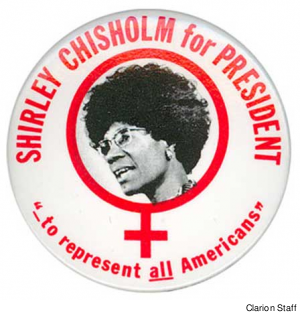One of Brooklyn College’s most famous alumni, Shirley Chisholm, is again in the news – 2012 marks the 40th anniversary of her historic campaign for the Democratic Party nomination for president.
The first African American woman elected to Congress, Chisholm was fearless. Her bold stances were not what was expected of a member of Congress, much less a candidate for president. But for Chisholm, political courage was not an obstacle to practical achievement: it was how she got things done.
BARBADOS TO BROOKLYN
 Chisholm was born in Brooklyn in 1924, the daughter of Caribbean immigrants. She spent her formative years in Barbados living with her maternal aunt and grandmother.
Chisholm was born in Brooklyn in 1924, the daughter of Caribbean immigrants. She spent her formative years in Barbados living with her maternal aunt and grandmother.
Chisholm’s roots in politics developed during early childhood. She was a young girl in Barbados at the beginning of the Barbados workers’ and anti-colonial independence movements. Her father was an ardent Garveyite and supporter of trade union rights. Her adored grandmother, aunt and mother worked in the homes of wealthy white families; Chisholm never forget their stories, and as an elected official always fought for legislation on domestic workers’ rights.
Returning to Brooklyn in 1934, she graduated from the prestigious Girls’ High School and then magna cum laude from Brooklyn College in 1946. A college activist, she was member of the Harriet Tubman Society which fought for integration of the troops during the end of World War II, for courses in African American history and for greater women’s participation in student government.
Chisholm got her master’s degree in early childhood education, then joined in local politics. During her time in the Brooklyn Democratic Clubs she challenged the all-white and all-male power structure, transforming the 17th District Club into one which brought in more people of color into local politics. (It was no accident that her 1970 memoir bore the title Unbought and Unbossed.)
In 1964, she became the first African American woman from Brooklyn elected to the New York State Assembly. She believed her greatest achievement in Albany was passing the Search for Education, Elevation and Knowledge program, SEEK. Now named after Percy Sutton, prominent civil rights attorney and Chisholm’s colleague in Albany, SEEK paved the way for open admissions at CUNY, giving opportunities to low-income students to enroll in higher education and provide academic support to ensure their success.
VITAL ROLE OF SEEK
The program became vital to making CUNY more representative of New York City, bringing in African American, Latino, working-class and immigrant students and supporting them in college studies – a role it continues today. Former New York Mayor David Dinkins, who worked with Chisholm in Albany on the SEEK legislation, credits Chisholm and Sutton with pushing it through.
The SEEK legislation was not Chisholm’s only accomplishment in Albany. She also worked for the legalization of abortion, access to childcare, maternity rights for teachers and legislation for domestic workers’ rights. When elected to Congress in 1968, from Brooklyn’s 12th District, she was more outspoken in her opposition to the Vietnam War and her support for women’s rights. She was one of the founders of the Congressional Black Caucus, The National Women’s Political Caucus, as well as the National Abortion Rights Action League, serving as its honorary chair.
She used her presidential campaign as a platform for her issues, particularly childcare and ending the Vietnam War. She voiced support for lesbian and gay rights as well as Puerto Rico’s right to independence. Instead of stepping to the side for a more “winnable” (white and male) candidate, Chisholm pushed across the country to engage voters in thinking about the kinds of change that their country needed. She came to the Miami convention with 151 delegate votes, more than any other woman in history. After the election she continued her work in Congress for another ten years.
At the time of her death in 2005, the Shirley Chisholm Project of Brooklyn Women’s Activism was established with the mission of bringing Chisholm’s life and legacy to the general public through collecting archival materials, holding educational public forums, and making materials publicly available on a website that also provides K-12 curricula.
In interviews for the Shirley Chisholm Project, her impact has been clear. Professor Anita Hill, last November at the Shirley Chisholm Day celebration at Brooklyn College, remembered how thrilling it was for her, a young black adolescent girl, to see Chisholm running for president. “Those things matter,” Hill said. “Having that face, that strong voice, that someone who looked like me who sounded like me.”
Donna Brazile, political strategist and a lifelong friend, stressed to interviewers that if Chisholm were alive today, she would be fighting to defend the gains that she worked so hard to win. At a time when access to higher education, access to birth control, and the social safety net are all under attack, Chisholm’s voice and passion are as relevant today as they were 40 years ago – when she threw her hat in the ring.
______________________________
Barbara Winslow is an associate professor of secondary education and director of the Shirley Chisholm Project of Brooklyn Women’s Activism at Brooklyn College.

